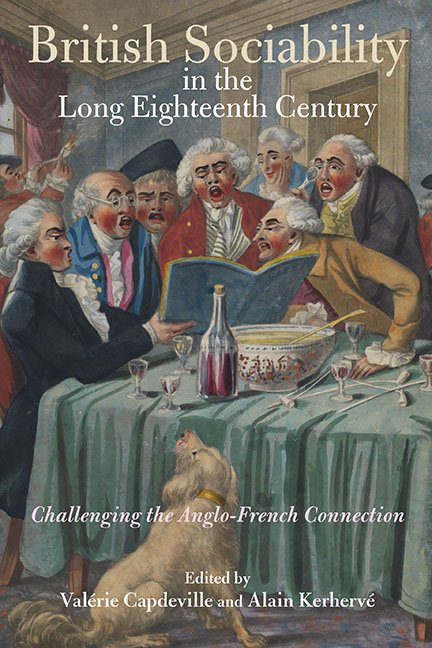Book contents
- Frontmatter
- Contents
- List of illustrations
- List of contributors
- Foreword
- Acknowledgements
- Introduction
- Part 1 Emergence of new political and social practices
- Part 2 Competing models of sociability
- Part 3 Paradoxes of British sociability
- 10 In company and out: the public/private selves of Johnson and Boswell
- 11 Friendship and unsociable sociability in eighteenth-century literature
- 12 The anti-social convivialist: toasting and resistance to sociability
- 13 Sociability and the Glorious Revolution: a dubious connection in Burke's philosophy
- 14 Respectability vs political agency: a dilemma for British radical societies
- Conclusion
- Bibliography
- Index
13 - Sociability and the Glorious Revolution: a dubious connection in Burke's philosophy
from Part 3 - Paradoxes of British sociability
Published online by Cambridge University Press: 18 September 2019
- Frontmatter
- Contents
- List of illustrations
- List of contributors
- Foreword
- Acknowledgements
- Introduction
- Part 1 Emergence of new political and social practices
- Part 2 Competing models of sociability
- Part 3 Paradoxes of British sociability
- 10 In company and out: the public/private selves of Johnson and Boswell
- 11 Friendship and unsociable sociability in eighteenth-century literature
- 12 The anti-social convivialist: toasting and resistance to sociability
- 13 Sociability and the Glorious Revolution: a dubious connection in Burke's philosophy
- 14 Respectability vs political agency: a dilemma for British radical societies
- Conclusion
- Bibliography
- Index
Summary
EDMUND BURKE was never without friends and was highly valued by some of the most eminent among them. That was practical sociability, but, apart from his membership of Samuel Johnson's Literary Club, does it tell much about the significance in his life of those new modes of sociability that were developing at the time? Such new modes went quite a long and potentially dangerous way. Analysing the ‘rejuvenation of the ancient doctrine of the social contract’, setting up new and ultimately confusing notions of what ‘the people’ meant, while depriving the same people of older landmarks about their relationship to political power, Yves-Marie Bercé admits that ‘the new sociability created in the 1760s nursed all the potentialities of regimes calling on the spirit of democracy’, adding that ‘one is not the dupe of the jolts of political chronicles when one acknowledges that the late eighteenth century was an entrance into another historical era’. Although Bercé's concern is with the political level, not with those clubs and salons that contributed so much to the ‘new sociability’, the two phenomena – social contract theories and the emerging fashionable sociability – easily connect. In this respect one can profitably turn to Augustin Cochin and his positive reassessment by François Furet. Indeed Bercé does not suggest – which would have been grotesque – that there existed waterproof partitions between the more political and the more social aspects. Beyond Bercé, Furet and Cochin, one can also remember Tocqueville's analyses of a common tendency towards abstraction, the blank slate and rationalism characterising the whole of the new mood in the eighteenth century. This sheds light on what, in those related political and social aspects, created something new with which Burke was even more uneasy than Tocqueville ever was.
It was not simply the best-known aspects of abstraction that worried Burke. They did exist and engaged him much more than he might plausibly have wished. But they may also, indirectly at least, have helped him, albeit sketchily so, to realise that sociability was best left unsystematised. As a result, his diffidence with all expressions of a ‘new sociability’ went together with a little-noted, though identifiable enough, approach to the Glorious Revolution that was both extolled and demythologised.
- Type
- Chapter
- Information
- British Sociability in the Long Eighteenth CenturyChallenging the Anglo-French Connection, pp. 237 - 250Publisher: Boydell & BrewerPrint publication year: 2019

